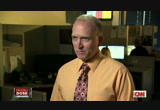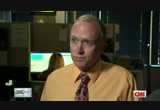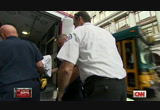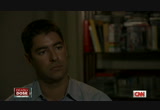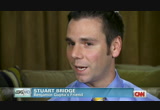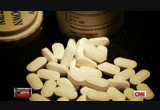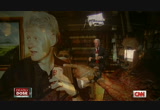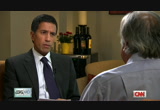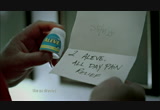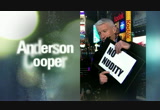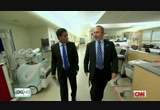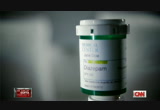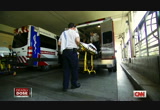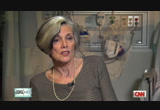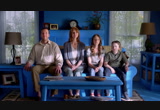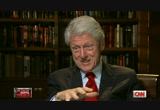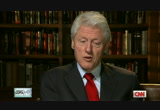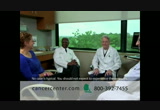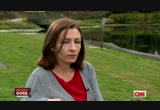tv Sanjay Gupta MD CNN December 30, 2012 4:30am-5:00am PST
4:30 am
boston could see up to eight inches of snow today. the city's mayor has already declared a snow emergency. a top priority there is getting the roads ready and cleared for public safety. freezing temperatures are in the forecast for this week. some good news this morning about former president george h.w. bush. we're told he's improving and has been moved out of the intensive care unit of the houston hospital where he was being treated for an elevated fever. the 41st president has been in the hospital for more than a month now. the u.n. arab league envoy for syria says the situation in the war torn country is getting worse by the day. this weekend may be proving him right. opposition activists say at least 397 people were killed across syria yesterday alone. if true, it would be the deadliest day yet in almost two years of civil war. the opization says more than 200 of those killed were captured and executed by syrian government forces following a battle. more news at the top of the
4:31 am
hour when cnn sunday morning continues. but first "sanjay gupta md" starts now. [ sirens ] >> this is a drug overdose call. every 19 minutes in the united states, someone dies of an accidental overdose. >> this is crazy. not a single solitary one of these people has to die. >> we're used to thinking of it starting here, looking like this. but something happened in this country. and now increasingly, it starts here, in your own home. >> went to sleep, he had no idea this was going to be his last night on earth. >> from misusing perfectly legal prescription drugs. taking a deadly dose. ♪ [ phone ringing ]
4:32 am
>> this is deborah. >> hello. i'm a little concerned i may have taken something that wasn't good for me on accident. [ phone ringing ] >> i took methadone from my grandpa. >> okay. >> and they were ten milligrams. >> what you're listening to are actual calls at the washington poison center in seattle. >> just drowsy, okay. >> and lately, more and more of them sound something like this. >> yesterday i took about 90 milligrams of perkocet. >> oh, you did? >> 6:00, i wasn't really thinking, and i did a bar of xanax and i'm reading this stuff online about how that's a lethal combination. i have a lot of friends who died in their sleep and i just wasn'tp thinking. so now i'm wondering if i should stay up tonight. >> that kind of call to me is really scary. >> oh, it is scary. >> what goes through your mind? >> i would be very frightened
4:33 am
about that young man not making it through the night. >> dr. bill hurley is the medical director of the poison center. he's also a trauma doctor. >> possibly too many of his meds, they're not sure what all they've got. >> we are here in seattle in part because the problem is bad. >> this bottle still has quite a bit in it. >> but also because, as you will see, there are real solutions. >> no other meds. >> for hurley, it started five years ago. >> he's got pinpoint pupils. >> he started noticing overdoses, a lot of them, coming through his e.r. doors. >> we thought these are guys on the street maybe using heroin. >> but looking deeper, he realized they weren't junkies, not at all. it usually began with a back sprain. >> they were taking these medications not to get high, but to try to control pain. in most cases, back pain. and then they were mixing them with other medications and having fatal reactions to that. >> a lot of people have back pain, a lot of people take pain medications for that pain.
4:34 am
and what you're saying is a lot of those people are then dying. >> yeah, a lot of them are dying and a lot of people in our culture right now are at risk of dying from the exact same thing. >> car crashes are no longer the number-one reason people die accidentally in the united states. nowadays, it's actually prescription drugs. that's because on any given day, people take more than the recommended dose. mix and match, or take medications not prescribed to them. maybe take pills with alcohol. and all of it can make for a deadly dose. in fact, the most recent data shows 37,000 drug overdose deaths in one year. mostly accidental. about 21,000 involve prescription drugs. and of those, 75% were pain killers. >> this could be you, it could be me. >> and that's the point. it could be anyone.
4:35 am
[ sirens ] >> on december 19th, 2011, benjamin gupta, a long mba student at george washington university died suddenly, mysteriously. he's no relationship to me, but when his family got word, they spent hours trading phone calls. they were in stunned disbelief. >> there was a message from his mom. and she had left three messages for me. so i knew there was something wrong. and i called her back, and i said, "what happened?" and she says, "it's ben. he died." i didn't have any information. >> i finally said, "how did this happen?" and she said he went to sleep the night before, and he just never woke up. >> he's always smiling, you know, in every picture. >> for days, ben gupta's family
4:36 am
was desperate for answers. what killed him? he was only 28 years old. he had recently been given a clean bill of health. how could he just not wake up? >> and then the thought went through my mind that maybe it was some sort of brain aneurysm or something must have happened. >> but his father was in for a shock after a conversation with a doctor who performed ben's autopsy. >> he called me and he says, yes, you know, they found oxycodone in his system. >> he tells you, he believes that your son died of an overdose of narcotics. >> yeah, right. >> did you think it was possible? what you knew of your son? >> no. no. >> he worked for the state department and he was going to graduate in a year with a dual law and mba degree, the type of person where it just doesn't even run through your head he's having a problem because he does so well. >> stuart bridge was a close
4:37 am
friend of ben's. they met in grammar school. ben told stuart that he and his new girlfriend had tried oxycodone and they thought it was no big deal. >> it's not something that i'm seeking out, but it's something i've tried. >> anyone else might just shrug off that conversation. but bridge wasn't just a friend. he's also a doctor. and he warned ben about taking oxycodone and about mixing it with alcohol. >> i have seen people die who are on these medications or who have experimented with these medications. >> the line between experimentation and death, it turns out, is tenuous. oxycodone and other pain killers like it are what's called central nervous system or cns depressants. they slow down the body's vital functions, breathing, heart rate, blood pressure. that's not usually a problem when the pills are prescribed for you. but when you add them to other
4:38 am
cns depressants, like alcohol or other prescription drugs, the effect is multiplied. the nervous system slows and is slows until breathing, heart rate, brain function, all grind to a halt. ben's deadly dose, according to his girlfriend, was drinking beer and scotch throughout the day, along with an unknown quantity of oxycodone. ben fell asleep in front of the tv. and by the next morning, he had stopped breathing. >> it's almost what makes it even more frightening. that he went to sleep and he had no idea this was going to be his last night on earth. he had no idea this was going to be it. >> you explained what happened to my friend to me in two sentences. >> i first learned about ben gupta's story when i got a phone call just after his death from former president bill clinton. ben's father is an old friend of the clintons. >> what kind of a kid was he?
4:39 am
>> a light shined out of him. that's all i can tell you. he grew up, he was big, strong, handsome, smart. and wanted to make something of his life. he was industrious, but he was normal. he liked to have a good time. he had -- i promise you that night, he had no idea that he was turning out the lights. none. and if it's true of him, it's got to be true of a lot of other people. >> he finds some solace from his son's death by funding programs that educate people about the dangers of misusing prescription drugs. and recently, he made a $1 million pledge to the clinton global initiative, to support the former president's new-found passion about this issue. >> he said, i have been very fortunate. and my son was worth $1 million. >> it's still hard to talk about. >> oh, it is, it is. >> do you think it ever won't be? >> no.
4:40 am
i think about him all of the time. like in d.c. today, so i went walking on the gw campus. looking for him. >> you were looking for him. >> yes. and i could feel it. i could feel him. every day i just think about him. every day. >> we've seen absolute skyrocketing of overdose deaths, and it correlates directly with the number of prescriptions. ♪ [ male announcer ] everyone deserves the gift of all day pain relief. this season, discover aleve. all day pain relief with just two pills. your doctor will say get smart about your weight.
4:41 am
i tried weight loss plans... but their shakes aren't always made for people with diabetes. that's why there's glucerna hunger smart shakes. they have carb steady, with carbs that digest slowly to help minimize blood sugar spikes. and they have six grams of sugars. with fifteen grams of protein to help manage hunger... look who's getting smart about her weight. [ male announcer ] glucerna hunger smart. a smart way to help manage hunger and diabetes. it's lots of things. all waking up. connecting to the global phenomenon we call the internet of everything. ♪ it's going to be amazing. and exciting. and maybe, most remarkably, not that far away. we're going to wake the world up. and watch, with eyes wide, as it gets to work. cisco. tomorrow starts here.
4:43 am
>> in cities across the country, this scene plays out every day. i saw it myself on a ride-along with lieutenant john fisk of the seattle fire department. >> the person had three diluded, two methadons. >> an anti seizure medication and couple of powerful pain killers. >> he may have stock piled some of his own and take it afterwards. >> it's called stacking. prescription pills stacked on top of other pills. each one amplifying the previous one's effect. >> i'd say it probably began about ten years ago. >> dr. steven anderson, an er dollar in washington state sees
4:44 am
the end result of stacking virtually every time he goes to work. >> i've taken two vicodin before, no problem. i've taken a valium to sleep before, no problem. i've had a couple drinks before, no problem. but all of a sudden, you add all of those into the same scenario, and it adds up and causes the complications. >> you're talking about when you say stacking, it sounds like making it exponentially worse. >> exactly. >> here's why. pop a pain pill, and you get pain relief. and at the same time, your breathing slows down. even after the pain relief wears off, that slowed breathing persists, sometimes for hours. now, if you pop another pain pill before it's time, you depress the breathing even more. some of the deadliest combinations, high-dose pain killers stacked on other pain
4:45 am
killers. pain killers stacked with anti-anxiety medications. or pain killers mixed with alcohol. >> we have seen absolute skyrocketing of overdose deaths and it correlates directly with the number of prescriptions that are written. >> the problem in part is that here in the united states, we are being flooded with pain killers. consider this. americans take 80% of the world's pain killers. 80%. distribution of morphine, which is the main ingredient in most popular pain killers, increased by 600% between 1997 and 2007. pain couldn't have increased that much in ten years. but pain killers did. it's become a lucrative business, and with so many pills out there, there's no broad system in place for doctors and pharmacies to keep track of it all. and, again, every 19 minutes, we see the consequence. and that doesn't even account for people like this man.
4:46 am
who came close, too close to dying. thankfully, he survived. an overdose is not the only side effect associated with powerful pain killers. >> when did you stop taking opiates? >> dr. jane valentine is an anesthesiologist at the university of washington. >> we have very good physical therapists. >> ten years ago while treating patients on high doses of pain killers, she found something surprising. not only were those patients not getting pain relief, but the pain killers were, in fact, doing something that could best be described as the opposite. making patients more sensitive to pain. it's called hyperalgesia. >> hyperalgesia was so obvious in those patients that you could, for example, see they couldn't bear the sheet on them or any intravenous stick was abnormally painful to them. >> you said that this has essentially been 20 years of failed experiment. >> i would never suggest that we shouldn't continue to prescribe for those that are really helped
4:47 am
4:50 am
former president bill clinton's familiarity with pain killers goes back to when he lived in the white house. >> have you ever been prescribed a medication like this? >> well, i did take some pain killers when i tore my -- 90% of my quadriceps, but i tried to be careful and i was in a lot of pain. >> and here's after leaving the oval office. he would once again need pain pills. he says he and his doctors were cautious. >> after my heart surgery, you know, when i was -- i hurt pretty bad for three weeks. so i got some medicine. but i really tried to get off of it as quick as i could. and my doctors were really good about it, telling me, you know, take this if it's killing you, but be careful. telling me takef it's killing you, but be careful. >> crisis center, this is rosie.
4:51 am
>> be careful. it's a warning that might prevent call after call pouring in here after the washington poison center. >> poison center. this is deborah. >> i wasn't getting pain relief, and i too many obsessioxycodono. i'm shaky and like headed and just nervous. >> how did we quietly become a country inundated with pain pills? some believe it began when pain was designated the fifth vital sign. >> i think physicians around the year 2000 started to get pushed to better manage pain, and the physicians in our culture, that means give out more medication. >> so pain becomes a vital sign. laws are passed liberalized the use of opiods for more than just cancer or chronic pain
4:52 am
management. doctors prescribe the drugs for legitimate reasons but with conditions that can be treated with milder medications or therapy. the result? we prescribe enough pain pills to give every man, woman and child a dose every four hours for three weeks. remember, 80% of the world's opiods are used by americans. 80%. does that surprise you? >> no, because -- >> is that a cultural problem? >> yes, it is cultural. people think, i have a headache. i've got this, and my elbow is sore, whatever. look, i don't want to minimize it. there are a lot of people who live courageous lives in constant pain, but there's no question that since we represent 5% of the world's people, we got no business popping as many bills as we do. >> problems is misuse it rampant. in 2010 about 12 million
4:53 am
americans reported using painkillers without a precipitation or medical need, and that number every 19 minutes someone died. the xhang leng, of course, is fintd wag to stop addiction and death without cutting off a lifeline. >> life starts to lose some of its meaning when you're in chronic pain. >> i have seen her curled up in the fetal position for hours. [ woman ] ring. ring. progresso.
4:54 am
i just served my mother-in-law your chicken noodle soup but she loved it so much... i told her it was homemade. everyone tells a little white lie now and then. but now she wants my recipe [ clears his throat ] [ softly ] she's right behind me isn't she? [ male announcer ] progresso. you gotta taste this soup.
4:56 am
you're taking more than we consider a safe dose. >> washington state has been hit hardest by the prescription overdose epidemic. >> i think this is the worst man made epidemic in history. >> when is the first time this even became an issue that you had noticed? >> by 2001 our claims managers were sending me cases of injured
4:57 am
workers who had had a low back sprain and were dead three years later from an unintentional overdose of prescribed opiods. it was the saddest thing i had ever seen. >> so he took action, helping write guidelines that became state law. it papplies no noncancer patients, treatment plans called pain contracts between physicians and patients and tracking of opiod use. >> if states don't renew laws reflecting best practices on universal precautions so opiods are used more safely and effectively, this will never turn around. >> the washington state law does have its share of critics, many of whom are patients dealing with pain right now. >> i have seen her curled up in a fetal position for hours, even crying at times. >> in tacoma, washington, christine and burt goal
4:58 am
e-husband and wife, are both in pain. his is caused by multiple sclerosis. >> my leg is constantly being electrocuted from the inside out. >> hers is caused by a car accident 16 years ago. >> i was in a big old '77 shelve station wagon, bent it in half. i looked in my rear-view mirror, i could see the woman putting mascara on, and i knew i was in trouble. >> putting on mascara? >> yes, that i could see. she just plowed right into me. unfortunately, to think day i still have back issues because of it. >> are you in pain right now? >> i am, yeah. the pain medications make a huge difference thank goodness. without them i don't think i would be able to work a full-time job. >> but she says after the new state law passed, no doctor would treat her. how hard has it been to find doctors who give you the medications you want? >> since this law passed it's
4:59 am
been incredibly difficult. i ended up calling multiple clinics. i would call and say, first words out of their mouth, if you want pain medications, forbet about it. we're done. >> christie believes doctors are turning away patients because they see it as a risk. >> a lot of them don't even look at them and weren't inclined to prescribe me the medications i was on. i just didn't think i could handle one more doctor's visit and feeling like i'm being attacked and being treated as a liar. >> the doctors here say the guidelines first published in 2007 as voluntary are reversing the overdose epidemic in their state. >> between 2008 and 2010, we saw about a 20% decline in the state in the number of deaths. >> possible solutions for washington state. what about the rest of the country?
209 Views
1 Favorite
Uploaded by TV Archive on

 Live Music Archive
Live Music Archive Librivox Free Audio
Librivox Free Audio Metropolitan Museum
Metropolitan Museum Cleveland Museum of Art
Cleveland Museum of Art Internet Arcade
Internet Arcade Console Living Room
Console Living Room Books to Borrow
Books to Borrow Open Library
Open Library TV News
TV News Understanding 9/11
Understanding 9/11


